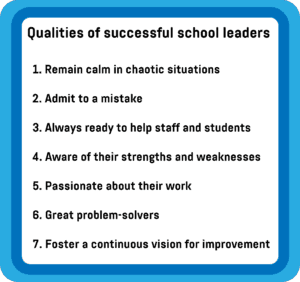- The secret to developing successful leadership in schools
- Steve Francis helps educators develop their leadership skills
- Learning 21st-century skills should be based on hands-on experience
- How CMU prepares its students to work in a real business environment
- Data analytics helps school officials improve leadership skills
- Placing students at the centre of the education system
Thriving in today’s labour market takes more than just having relevant technical skills. Employees are expected to go beyond the call of duty and demonstrate leadership and problem-solving capabilities. But these skills can’t be learned from traditional textbooks. Instead, to prepare for their future workplace, students should be able to experience real-world scenarios with practical examples, as well as witness inspirational leadership at their schools. Educational institutions can also use data and tech to find ever more efficient ways of helping students develop soft skills and tackle tomorrow’s challenges.
The secret to developing successful leadership in schools
To improve students’ outcomes and better prepare them for the future, schools and educators are turning to innovative solutions that make learning more fun and enjoyable. However, as challenges in this sector continue to emerge, more needs to be done. What many schools fail to realise is that having strong school leadership is pivotal to success, and knowing how to lead and inspire others is directly linked to student achievement.

According to the education resource provider ThoughtCo., successful school leaders are those who “arrive early and stay late”. In a school setting, a leader will remain calm even in the most chaotic situations. They’ll admit when they make a mistake and behave in a dignified manner. Leaders are always ready to help their staff and students and are aware of their strengths and weaknesses. What most successful leaders share is “a continuous vision for improvement”. Exceptional leaders are passionate about what they do, and through positive action and careful decision-making, they’re able to get others excited as well.
Whether they come from the education sector or any other industry, true leaders should be great problem-solvers. Lack of resources, conflicts among students or staff, and difficulties in program implementation are some of the issues that can occur in any school. However, leaders shouldn’t be focused on the problem itself, but rather on solutions. If they don’t find a solution in their field, they shouldn’t hesitate to think outside the box. Every problem is unique in its own way, and therefore requires a custom approach. Also, leaders understand that their teams can provide useful ideas, which is why they should listen to all parties to get the right feedback.
Steve Francis helps educators develop their leadership skills
Though school success depends on it, building leadership capabilities can be hard. Steve Francis, an education expert, wants to make the process easier for educators and school officials and help them reach their potential. Described as a “man on a mission to reform the education sector for the better”, Francis has been working in education for 20 years. Throughout the years, he’s been the principal of several schools in Australia, and he’s served as an executive at the State Principals’ Association. Today, most of his work is focused on helping educators develop effective leadership skills.
Francis, who’s considered to be “one of the top 50 most influential educators in Australia”, is also the managing director of the Happy School program. The program is designed to support school leaders and help them improve staff morale. Schools that become members of the program receive articles featuring strategies to reduce stress among staff. These articles, written by experts in the education field, teach school staff how to improve their work-life balance, better use their time, and have a more positive attitude. So far, over 600 schools have joined the program.
Besides the Happy School program, Francis also created Survey My Class and Survey My School, school improvement instruments developed to give students a platform to voice their opinions. Using these tools, educators can get feedback from students and use it to improve their work. According to the Survey My Class website, this solution “is designed to close the learning loop by providing teachers with feedback from their target audience”.
Learning 21st-century skills should be based on hands-on experience
The future workforce needs strong leadership skills and is expected to efficiently communicate, think, and solve problems. One of the best ways to acquire these 21st-century skills is through hands-on experience. For instance, the Academy of Notre Dame de Namur, a high school for girls in Pennsylvania, created a course called Design Thinking and Entrepreneurship to better prepare students for college and the workplace. The main goal is to encourage students to develop empathy and solve problems creatively by encouraging them to communicate and collaborate with each other.
Most importantly, the year-long course is designed to encourage girls to become leaders in the business world. In the first half of the course, they learn about the design process. After identifying a specific problem they want to solve, they analyse data and brainstorm ideas to come up with a product that could provide a solution. Once the product is created, the students continue with the second half of the course, in which they develop a business plan for their solution.
Within the course, students are also exposed to real-world scenarios. In 2019, for instance, a group of students from the Academy of Notre Dame de Namur took part in a business simulation game called ERPsim, held on the campus of Rider University in New Jersey, the US. Teams competed in selling products and optimising supply chains using business management software developed by SAP, a German tech leader in business applications. The key to increasing the revenue of the in-game company is close cooperation among different specialists. Also, each student was assigned a mentor, picked among Rider University students.
“Throughout the day, I watched students interacting with their mentors entirely on their own. The situation was perfectly organic, and is a true testament to the effectiveness of the simulation and the impact of the mentors,” explains Tyler Gaspich, who teaches at the Academy of Notre Dame de Namur. As Gaspich points out, this simulation has helped students get a completely new understanding of the business world. Since the simulation was held on the Rider University campus, visiting students also gained a glimpse into university life.
How CMU prepares its students to work in a real business environment
At the 7th ERPsim competition, students from Central Michigan University (CMU) also got a chance to use SAP’s technology to run a company in a simulation and get valuable hands-on experience. Those who had the biggest success in running the company were given scholarships. The event is also beneficial for major companies such as the Blue Cross Blue Shield health insurance firm, which often visits the competition to look for students who can think outside the box. Over the years, the company has hired 13 students from the competition. SAP’s software essentially prepares students to work in a real business environment, because many companies are leveraging the same technology. In fact, CMU’s SAP program director, Stephen Tracy, says that around 86 per cent of Fortune 1000 companies rely on their software.
Data analytics helps school officials improve leadership skills
Advanced technologies can help schools in other ways, too. For instance, educational institutions gather a wealth of information, such as student grades, alumni placement, parent suggestions, and staff feedback. School leaders can then use data analytics tools to guide their moves, identify the most efficient policies, and decide where to invest their time and resources. By listening to data-driven feedback, applying suggestions, and identifying patterns, officials can become better leaders. Software programs like Tableau can perform education analytics, such as correlating lesson plans to student performance or finding ways to increase enrollment rates. This feedback can then be used to improve operations in various departments. Constant improvements will also ensure that faculty becomes open to changes.
Data analytics is a powerful tool, but officials need to be aware of privacy concerns. For one, sensitive student data must be protected and schools need to hire security experts to identify and fix weak points in tech infrastructure. Also, educators are required to develop clear policies on who can access the collected data. To prevent misuse of student information, educational institutions need to make sure their data analytics solutions comply with laws and regulations as well. Furthermore, it’s important that teachers and students are aware of these rules and the ways in which data is protected and processed.
Placing students at the centre of the education system
Leadership, creativity, and collaboration are some of the skills that students need to have to survive in today’s competitive industries. Thanks to technology, it’s now easier for teachers to provide them with hands-on experience, enhancing skill learning. This model doesn’t place teachers at the centre of attention. Instead, they’re there to observe how students approach a specific problem and whether they communicate with their peers to solve the issue at hand. These and other educational methods will help educators instil leadership skills in students and ensure that they can thrive in today’s fast-paced society.




